Can chickens eat raspberries? Yes, chickens can eat raspberries. Raspberries are an excellent source of vitamins A and C and iron and magnesium. Chickens can benefit from the nutritional value of this fruit as long as it is given in moderation.
Raspberries are one of the sweetest fruits and should be given as a special treat, not a regular part of their diet. Chickens will go crazy for the sweet taste and texture; you’ll love watching them eat them.
However, it is important to note that these should be given in moderation, as too much sugar can upset the digestive system of chickens. This article will cover raspberries’ nutritional value, how to feed them to your chickens, and what dangers you should be aware of.
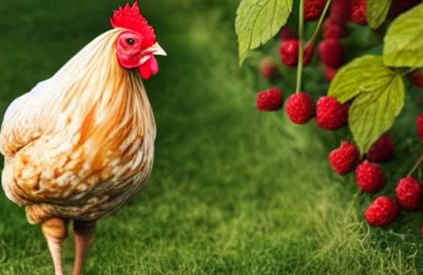
Can chickens eat raspberries?
Raspberries are rich in vitamins A, C, and E, as well as minerals such as calcium and magnesium. All these nutrients are essential for your chickens’ overall health and well-being. Raspberries also contain antioxidants that can help protect against cell damage from free radicals.
Furthermore, raspberries are naturally low in fat and calories and contain dietary fiber that helps keep the digestive system running smoothly.
When it comes to taste, most chickens love raspberries! They’re sweet and refreshing – especially when served chilled on a hot summer day – which makes them an excellent treat for your flock.
But while it’s ok to give your chickens the occasional raspberry, fruits should only make up 10% of their diet, as too many can cause digestive issues or other health problems.
[ChickenAffiliate]
The benefits of eating raspberries for chickens
You may have heard about feeding raspberries to your chickens, but you’re not sure if it would be beneficial. Let’s look at some of the benefits raspberries can offer your feathered friends.
Vitamins and Minerals
Raspberries contain essential vitamins and minerals like vitamins A, C, and K, manganese, magnesium, folate, and potassium. These are all essential nutrients that help keep your chickens healthy and strong.
In addition to providing these essential vitamins and minerals, raspberries also offer antioxidants that help protect against free radical damage in the body.
Fiber
Raspberries contain a good source of dietary fiber, which helps keep your chickens’ digestive systems running smoothly. Fiber helps move food through their systems more efficiently and helps prevent constipation from occurring.
It is especially important for egg-laying hens as it helps them produce healthier eggs.
Flavor
Who doesn’t love a juicy raspberry? They are sweet and tart, making them irresistible for chickens. It makes a delicious treat and encourages them to eat their regular feed since they know something tasty is waiting for them at the end of mealtime.
Natural Bug Repellent
Raspberries can act as a natural bug repellent. Eating raspberries can help keep pests away from your chicken coop, as they are full of compounds that act as natural insect repellents.
This means fewer bugs around your coop and less stress on your chickens.
Enrichment
Lastly, feeding your chickens raspberries provides mental stimulation and enrichment that keeps them happy and engaged in their environment.
Plus, it allows you to bond with them while offering this yummy treat.
Things to watch out for when feeding raspberries to chickens
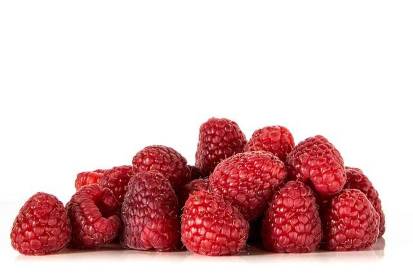
As with any food, there are a few things you should watch out for before feeding your feathered friends raspberries. Here are three important points to consider when it comes to feeding raspberries to chickens.
Moderation is Key
Raspberries are a delicious and nutritious treat for chickens but should not be given in excess. Too much of anything – even something healthy – can lead to health issues such as obesity and nutritional deficiencies.
Make sure you give your chickens a maximum of a few raspberries per day to ensure they’re getting the right balance of nutrition without overdoing it on any one type of food.
Avoid Moldy Berries
As with people, moldy berries can be dangerous for chickens. Before you feed your flock, inspect each raspberry for signs of mold or decay, such as soft spots or discoloration.
If you find any suspicious-looking berries, discard them immediately and ensure none of the others have been contaminated by contact with the suspect berry.
Give Them Fresh Raspberries
When feeding your chickens raspberries (or any other food), always opt for fresh over frozen or canned varieties whenever possible.
Frozen and canned fruits and vegetables may contain added sugars or preservatives that could harm your birds. Plus, fresh raspberries will taste better!
How often should chickens eat raspberries?
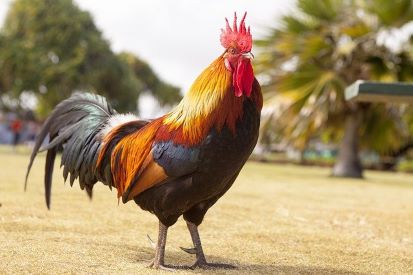
Chickens should only eat raspberries a few times a week as they should maintain a healthy balance of fruits and vegetables. In general, fruit intake should comprise at most 10% of a chicken’s total diet, as excessive amounts can cause digestive problems.
To maintain optimal health, it is crucial to give chickens a variety of healthy fruits such as apples, blueberries, and pears in addition to leafy greens like kale, romaine lettuce, and spinach.
If you want to treat your chickens with raspberries, offering them in moderation and rotating the type of fruit provided is the key to ensuring their diet remains balanced.
How to prepare raspberries for feeding to chickens
Not only are raspberries delicious and nutritious, but they’re simple to prepare. This guide will explain the steps to prepare raspberries before feeding them to your chickens.
Wash first
First, you must thoroughly wash all fruit and vegetables before feeding them to your chickens. Raspberries are no exception. Rinse them under cold running water, and you’re good to go.
Remove uneaten berries
When offering raspberries to your chickens, it is important not to overfeed them. Start by providing a small handful and observe how quickly they eat the berries. If all of the berries have been consumed within five minutes or less, it is safe to offer more in future feedings.
If any raspberries remain uneaten after five minutes, remove them from their enclosure as they may spoil quickly in warm conditions and cause illness in your birds.
Mash them if preferred
If you want to mash up the raspberries before feeding them, you can also do this easily! All you need is a wooden spoon and a shallow bowl.
Place the raspberries in the bowl and mash them up with the spoon until they reach a consistency that resembles thick jam or applesauce. Your chickens will love it!
Can baby chickens eat raspberries?
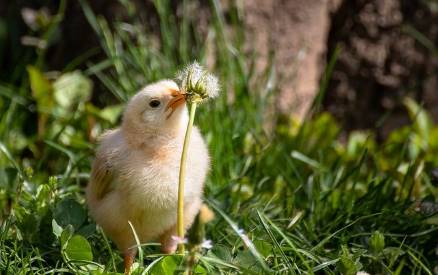
Are you wondering what you can feed your baby chicks? Thankfully, raspberries are a great option! However, like all food items, you should exercise caution. Wait until your chicks are a few weeks old, as their digestive system may not be mature enough to digest the fruit.
Further, when introducing raspberries, ensure to give them in moderation and monitor how they respond. That way, you can be sure they’re getting all the essential nutrition they need while enjoying the delicious flavor of raspberries.
Can chickens eat raspberry seeds?
Yes, chickens can eat raspberry seeds. The seeds are embedded in the raspberry and are perfectly safe to consume. Raspberry seeds are a great source of omega-3 fatty acids, which can help keep your chickens healthy.
Removing the seeds from the raspberries would be hard as they’re small. Therefore, it is best to feed your chickens the whole berry and let them enjoy the taste and nutrition.
Can chickens eat the leaves of a raspberry plant?
Chickens can eat the leaves of raspberry plants, but you should be prudent before allowing them to do so. Make sure that there are no pesticides on the leaves, as these substances are toxic to chickens.
Furthermore, watch out for any thorns on the raspberry plant, as they may harm the chicken if ingested or otherwise wound it in an attempt to access and consume them.
Always look for these two potential threats to ensure a safe experience for your chickens when eating raspberry plant leaves.
What other berries can chickens eat?
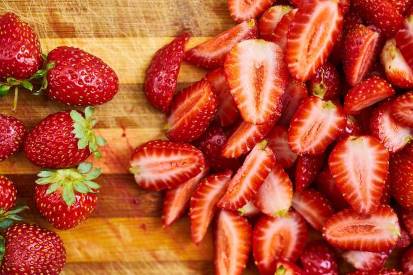
Raspberries are a popular treat for chickens, but there are many other berries chickens can enjoy. Let’s explore the different types of berries and how to introduce them into your chicken’s diet safely.
Strawberries
Strawberries are an excellent source of vitamins and minerals, including Vitamin C and iron. Strawberries also contain fiber, which is essential for healthy digestion in chickens. Since they can be eaten whole by chickens, they make a great snack or treat.
Read More: Can Chickens Eat Strawberries? 6 Excellent Benefits
Blueberries
The antioxidants found in blueberries help support a healthy immune system, making them an ideal snack for chickens. Blueberries also contain calcium, which helps maintain strong bones and eggshells in chickens.
Read More: Can Chickens Eat Blueberries? 5 Important Benefits
Blackberries
Blackberries are packed with nutrients like vitamins A and C, magnesium, potassium, and phosphorus, which are beneficial for your chooks’ health.
Blackberries tend to be quite tart and acidic; therefore, it is important to feed them occasionally as treats rather than as part of their regular diet. Additionally, blackberry leaves can be used as bedding material for the coop floor due to their natural antibacterial properties.
Read More: Can Chickens Eat Blackberries? 5 Fantastic Benefits
Cranberries
Cranberries offer several health benefits, such as promoting urinary tract health and improving digestion in chickens due to their high Vitamin C content and antioxidants.
As with any berry you feed to your flock, ensure you only provide cranberry treats in moderation since they are quite tart-tasting compared to other berries mentioned here.
Read More: Can Chickens Eat Cranberries? 6 Amazing Benefits
Mulberries
Mulberries are filled with numerous essential vitamins, such as Vitamin A and E, that promote overall good health in chickens.
When feeding mulberries to your flock, it is essential to remember that these fruits do have hard seeds inside them, so avoid giving large chunks or whole mulberries directly from the tree – instead, cut up any mulberries into smaller pieces.
Read More: Can Chickens Eat Mulberries? 6 Excellent Benefits
How to give chickens a healthy and balanced diet
A balanced diet ensures your chickens are healthy, happy, and productive. Let’s look at how to give chickens the nutrients they need for optimum health.
Protein-Rich Grains
Grains can provide chickens with protein. These should include wheat, barley, oats, and corn, as well as mealworms or other insects if available.
Feeding your chickens a mix of grains will give them the variety they need to stay healthy. However, avoid feeding them too much grain as it can lead to obesity and other health problems in chickens.
Greens and Vegetables
Vegetables provide essential vitamins and minerals for your chickens’ growth and development. Offer your flock fresh vegetables such as carrots, pumpkins, spinach, and broccoli regularly – either in their feed or through treats like lettuce leaves or kale stalks.
You can also offer them fruit like apples and pears; however, feed these sparingly as some fruits contain high levels of sugar, which could harm your birds in large amounts.
Calcium Supplements
Chickens need calcium for strong eggshells and bones. If you’re giving your flock small amounts of commercial feed, ensure it contains enough calcium. Otherwise, supplement with crushed oyster shells or ground limestone powder twice a week.
Calcium supplements are vital if you have laying hens in your flock.
Can chickens eat raspberries – final thoughts
In summary, raspberries are perfectly safe – and even beneficial – for chickens to eat in moderation. Not only do they provide essential nutrients such as vitamins A, C, and E, but they also taste great, so your flock will love them!
Just remember to keep raspberry treats to 10% of their total diet or less to avoid any potential issues down the line. With proper care and a balanced diet, including the occasional raspberry, you can ensure that your chickens stay healthy and happy for years to come.
Related Articles:
